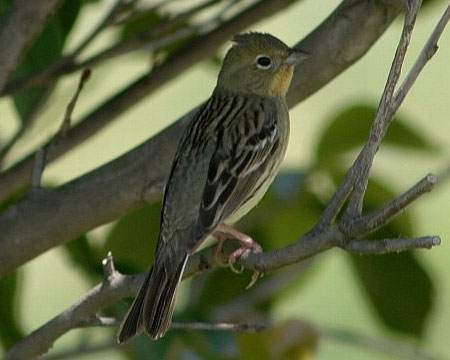むなかたが集まる
電子データベース
電子データベース
ノジコ

| 種目 | ノジコ (野路子) | 分類 |
スズメ目 ホオジロ科 ホオジロ属 |
学名 | Emberiza sulphurata | 英名 | Japanese Yellow Bunting |
|---|---|---|---|---|---|---|---|
|
ノジコ (野路子) |
スズメ目 ホオジロ科 ホオジロ属 |
Emberiza sulphurata | Japanese Yellow Bunting |
宗像市でみられる場所・時期
宗像では旅鳥で,渡りの時期(4月後半から5月初旬,9月ころ)に島嶼部で稀に観察される。観察できる機会は乏しい。
特徴
全長14㎝でスズメより小さい。雌雄ほぼ同色である。
頭部から体上面は,灰黄褐色で,白いアイリングがある。尾は眼先が黒いが,眼は眼先に黒みがなくやや赤みがある。腮以下の体下面は黄色で,下腹から下尾筒は淡黄色で白っぽい。
嘴は灰褐色で,上嘴の嘴峰は黒ずんでいる。足は橙褐色である。
習性
平地から山地の,林床に草藪があり,灌木が混じる高木林や疎林などに飛来する。繁殖期以外は一羽又は小群で生活する。林縁や地上を跳ね歩きながら草木の種子,昆虫,クモ類などを食べる。
「チョンチョイ ピーピリッピ」と囀り,「ズッ」などと鳴く。
分布
夏鳥として本州中部以北の山地から,亜高山帯の林,林縁近くの草地などに局地的に生息する。渡りの時期には,市街地の公園や草地,河川敷,農耕地などでも観察できる。北海道では稀である。
世界的に見ても,繁殖地は日本列島本州北部に限定され,台湾,フィリピンのルソン島,福建省,広東省の一部で越冬する。
 はじめに
はじめに お問い合わせ
お問い合わせ